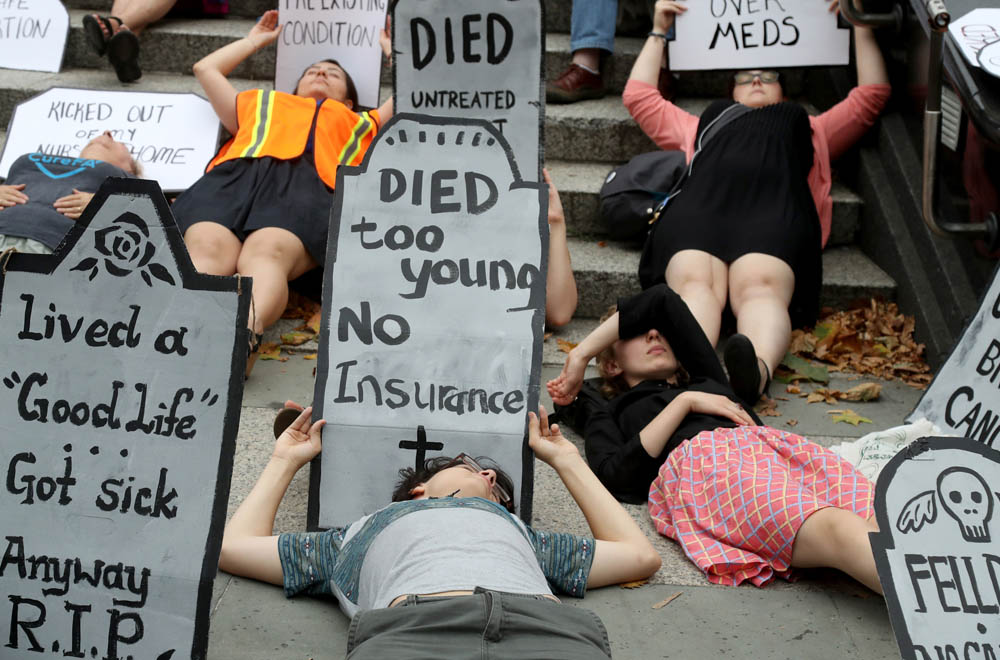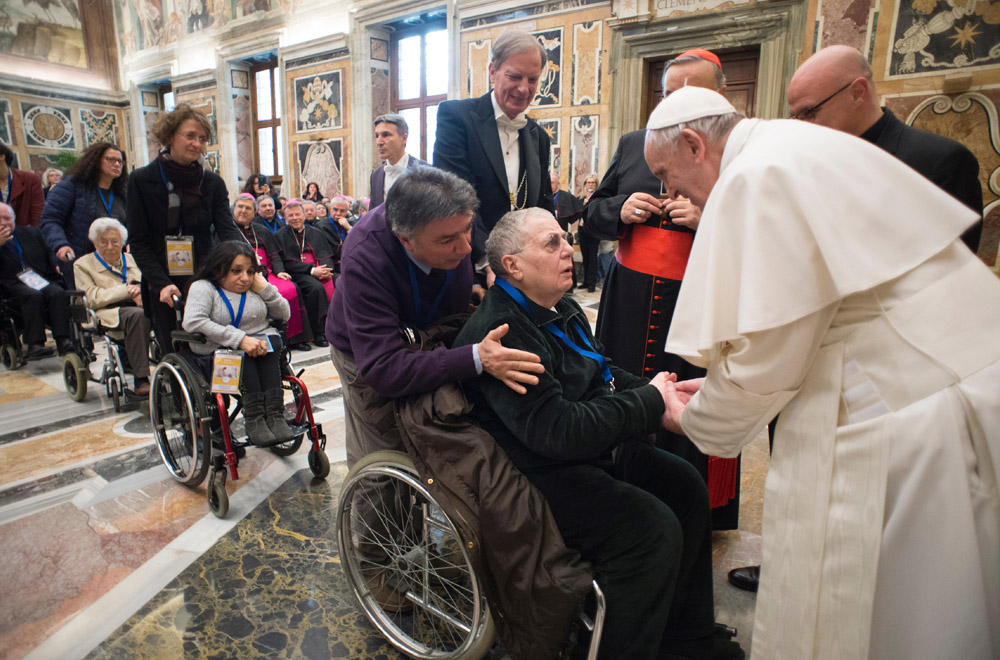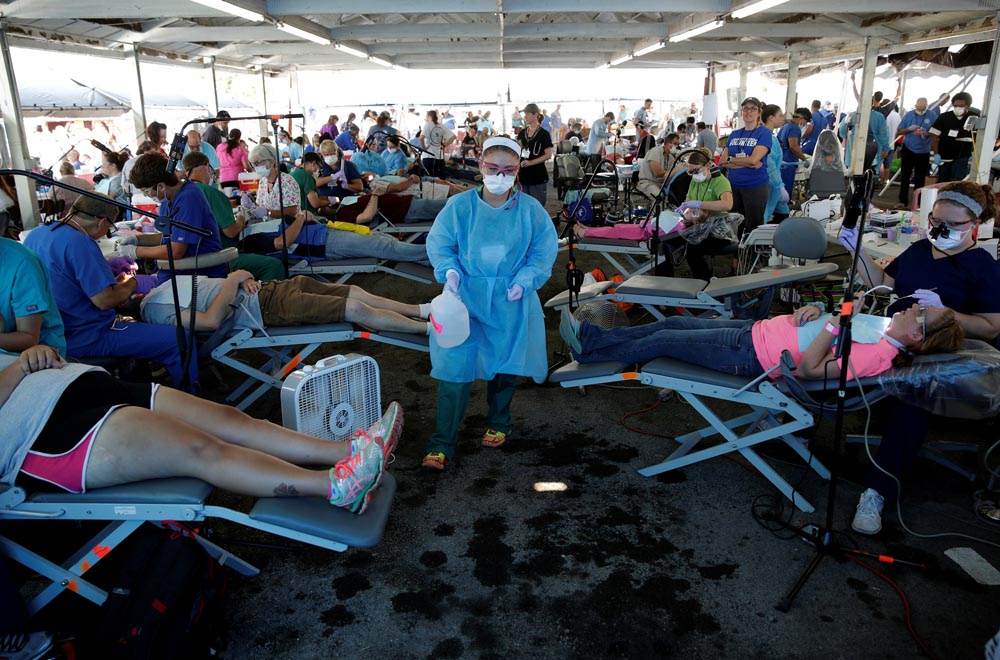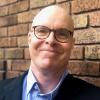
People illustrate the importance of affordable health care in New York City July 13, 2017. (CNS/Andrew Gombert, EPA)
Mark Trover of Indiana had a job and access to health insurance, but the premiums and co-pays were too high for him to afford. A doctor had prescribed medicine for his dangerously high blood pressure, but the cost was high and Trover stopped filling the prescription — right up until the time he suffered a stroke that left him permanently disabled.
Karyn Wofford of Georgia has type 1 diabetes, and has often been forced to ration the insulin she needs to survive. The cost of the medicine has risen over 1,000 percent in recent years, and the 29 year-old knows there are many other Americans who have suffered and even died from diabetic ketoacidosis because they could not afford the medicine. "Having access to diabetic supplies and insulin, to feel okay when I wake up in the morning — that's my dream," she wrote for the T1 International blog.
These stories represent the status quo of U.S. health care. Even after the Affordable Care Act, there are over 28 million people in our country living completely without health coverage, a group disproportionately made up of people of color. Among those who do have insurance coverage, nearly a third are enrolled in high-deductible insurance plans that can force them to skip filling prescriptions or go without other necessary care.
For those who do obtain care, the side effect is often crippling debt: one out of four Americans under 65 carry past-due medical debt, and health care costs are the leading cause of family bankruptcies. For millions of Americans, dental care means relying on what one magazine recently called "pliers, chisels, and whiskey" for removal of their decayed teeth.
Our health care system has turned us into a country of beggars. GoFundMe's CEO says that the website's hundreds of thousands of pages pleading for help paying for medical procedures and prescriptions "put GoFundMe on the map." This state of affairs may be good for the company, but the vast majority of medical treatment crowdfunding campaigns don't meet their target.
In response to the mean-spirited and fiscally self-sabotaging efforts to repeal the Affordable Care Act last year, faith groups raised their collective voice, and to great effect. Dozens of denominations and organizations from a wide range of faith traditions issued joint statements, mobilized their members, and conducted a dramatic Capitol Hill vigil. They brought a morally powerful foundation to the resistance to Affordable Care Act repeal efforts.
As a March 2017 letter signed by leaders of 40 faith organizations said, "The scriptures of the Abrahamic traditions of Christians, Jews, and Muslims, as well as the sacred teachings of other faiths, understand that addressing the general welfare of the nation includes giving particular attention to people experiencing poverty or sickness."
That shared mandate compelled us as people of faith to act to preserve the Affordable Care Act, which has expanded care to millions of Americans who needed it. Now, those same sacred teachings require us to speak out with just as much urgency to fully repair the gaps left behind even after the act is preserved.
Profiting from sickness
The foundational flaw in our U.S. health care system is its cruel focus on extracting corporate profits from the struggling and the sick. We generate billions of dollars each year for for-profit insurance companies and monopoly-protected pharmaceutical corporations, but the resulting injustice and inefficiencies have made us the globe's most notorious underachiever in health care. Among comparable nations, we consistently pay the most for our care while enduring worse outcomes.
Let's be clear about the real-world meaning of "worse outcomes:" every year, tens of thousands of Americans die preventable deaths due to the lack of adequate health insurance. Millions more suffer needlessly from grinding pain and disability.
Many of the gaps in U.S. health insurance coverage can be traced back to our reliance on employment-based health insurance. In this respect, we are an outlier in the global economy, clinging to a mid-20th century model that is mismatched with current economic realities and the nature of our workforce. But other gaps are found within our government health care programs, where corporate campaign contributors and lobbyists from the so-called medical-industrial complex have persuaded our elected leaders to divert taxpayer health dollars into the coffers of for-profit companies.
The Affordable Care Act handed a key to the health care cash register to private insurance companies, thus requiring taxpayers to pay for those companies' administrative bloat, quarterly profits, and CEO salaries that can go as high as $17 million per year. Medicare and Medicaid also carve out a large piece of their resources for the benefit of private insurance companies and sweetheart no-negotiation deals for pharmaceutical corporations. These handouts to corporations exact their cost on patients and taxpayers alike: Medicare and Medicaid both have significantly less effective coverage compared to the programs of other nations that refuse to subsidize for-profit companies.
Pope Francis is among many faith leaders who has condemned the treatment of life-essential care and medicines as a commodity to be leveraged for maximum corporate profits. "Health is not a consumer good, but a universal right," Francis said in 2016. "So access to health care services cannot be a privilege."

Pope Francis greets a person in a wheelchair Feb. 10, 2017, during a Vatican audience with people attending a meeting on health care ministry. The pope said a nation's health care system cannot be run simply as a business because human lives are at stake. (CNS/L'Osservatore Romano)
Faith and the human right to health
The U.S. faith community can take justifiable pride in providing direct charity health care, and our response to the current crisis should continue to embrace that legacy. But when even our best charitable efforts leave enormous gaps in coverage, people of faith in the U.S. are also called to do more. We must loudly and insistently affirm that health care is a human right, foundational for the exercise of all other human rights. Despite its lack of realization in the U.S., the right to health care has been well-established in international law for more than 70 years. Its roots in faith traditions go far deeper, with all major religious traditions embracing a clear responsibility to provide for the poor and the sick.
Of course, there are dozens of New Testament references to Jesus performing acts of healing, so many that he was often referred to in the early church as "The Great Physician." The Old Testament includes health care mandates throughout, including in Proverbs 31:9, Isaiah 1:17 and Deuteronomy 15:11 ("You shall open wide your hand to your brother, to the needy, and to the poor.") History's first structured charity hospitals were built by Islamic communities, fulfilling that faith's unequivocal mandate to care for the needs of the poor. The Buddhist, Taoist, and Confucian traditions are replete with similar health care examples dating back as far as 400 B.C.
Health care needs across our society are vast in both their scope and complexity, and even political conservatives concede that a market-driven approach is a poor fit for meeting the needs of the sick and the struggling. The same is true for our societal challenges of ensuring public safety, a functioning infrastructure, and protection of our legal rights. We meet those challenges with communal systems, where our government acts in our names and is accountable to us all. With health care, we must do the same.
There is a proven model for achieving that type of health care system, a compassionate alternative to the cobbled-together, profit-oriented mess that we endure now in the U.S. That model is a single-payer health care system. Single-payer is simple and efficient. Its hallmark feature is a guarantee that all U.S. residents are covered from birth to death for all of our health needs, from doctor visits to prescription medicines to dental and vision care.

A volunteer walks past people receiving dental care July 22, 2017, at the Remote Area Medical Clinic in Wise, Virginia. (CNS/Joshua Roberts, Reuters)
Single-payer health care
The term single-payer refers to the government being the responsible party for health care bills, as is the case now in countries like Canada and Taiwan. It is also the foundation for the core components of our own Medicare system. Under single-payer, coverage is no longer tied to the fine print in private insurance policies or the whims of employment. Premiums, co-payments, and deductibles disappear.
That may sound like a utopia, but universal coverage and low-cost care is the norm for other countries with the resources the U.S. enjoys. Their experiences prove that we can provide better care thanks to the hundreds of billions of savings gained by bypassing the bloated administrative costs associated with for-profit claims processing, billing and marketing. Further savings come from using single-payer bulk purchasing power to negotiate down the skyrocketing costs of prescription drugs, as other nations do quite successfully.
People of faith can help debunk some of the myths about single-payer, most of them originally concocted by corporations desperate to preserve their lucrative healthcare business models. First of all, single-payer is not so-called "socialized medicine." As in the Medicare system, the government under single-payer pays the bills but does not operate hospitals and hire physicians. Compared to restrictive private insurance policies, our choices for where we obtain care will actually expand under single-payer.
Second, stories of delayed medical procedures in single-payer countries like Canada are greatly exaggerated, especially since there is never a waiting list for urgent care. Instead, generations of Canadians have grown up not knowing what it is like to worry about paying a medical bill, and universal coverage is obtained at about half the cost of our patchwork U.S. system. A whopping 94 percent of Canadians report taking national pride in the success of their health care system.
The faith community embrace of single-payer would put us in good company. Frustrated by the hours they spend every day on private insurance paperwork, a majority of U.S. physicians now support a single-payer system. So do many business leaders,who struggle with ever-increasing insurance costs for their employees. Warren Buffett calls the U.S. health care system the tapeworm of U.S. competitiveness, which is why he supports a single-payer alternative. Legislation packaged as "Expanded and Improved Medicare for All" has over 120 co-sponsors in the U.S. House of Representatives and support from a growing number of senators, reflecting polls that show a majority of Americans support a single-payer system.
Advertisement
But the will of the people does not always translate into changed policies, especially when heavily financed lobbyists and campaign contributors from insurance and pharmaceutical companies block the path. That is where the faith community comes in. The economic argument in favor of a single-payer, universal health care system is undeniably powerful, but the moral case for health care as a human right is even stronger. The faith community stands in the ideal place to advance that moral argument.
People of faith, acting individually and in concert with their congregations, denominations and other organizations, played central roles in the great human rights movements of the modern era. Faith community action was central to the success of the U.S. civil rights movement, the anti-apartheid movement, and the slavery abolition movement. We can make change happen again. That is especially true in the context of health care, where generations of "walking the walk" in providing direct care endows the faith community with well-deserved moral authority on this issue.
We are called to speak out and to take action for health care as a human right. Our brothers and sisters are suffering, but we carry the prescription for their healing in our pockets.
[Fran Quigley is director of the Health and Human Rights Clinic at Indiana University McKinney School of Law and coordinator of People of Faith for Access to Medicines.]








